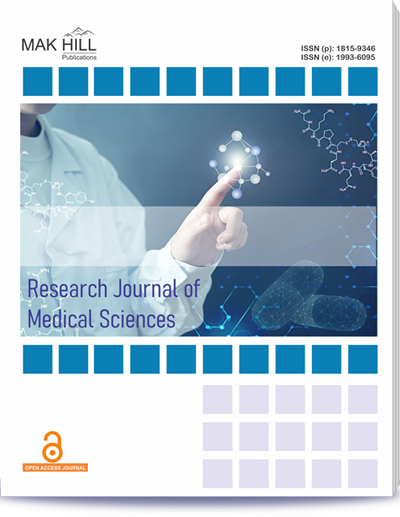
Research Journal of Medical Sciences
ISSN: Online 1993-6095ISSN: Print 1815-9346
Abstract
The COVID‐19 pandemic had a profound impact on children’s lives globally, including in India. The closure of schools, enforced social distancing and isolation measures significantly affected the psychological health and sleep patterns of children. This study investigates the impact of the COVID‐19 pandemic on psychological health problems and sleep disturbances among children in India. This cross‐sectional study involved 170 children aged 8‐16 years, recruited from the pediatric outpatient department of Sri Balaji Action Medical Institute, New Delhi. Simple randomization was used to select participants. The Revised Child Anxiety and Depression Scale‐Parent Version (RCADS‐P) and the BEARS Questionnaire for sleep disturbances were utilized. Data collection involved offline questionnaires filled out by parents, and the data were analyzed using SPSS software. Statistical significance was set at p<0.05. of the 170 children, 54.71% were males and 45.29% were females. The majority (45.88%) were aged 11‐13 years. Clinical depression was observed in 15.88% of the children, while 15.29% had clinical generalized anxiety. Separation anxiety was clinical in 12.35% and borderline in 7.06%. Social phobia, panic disorder and obsessive‐compulsive disorder were less prevalent. Sleep problems were reported in 21.76% of the children. Significant associations were found between psychological problems and factors such as age, parents education level, socioeconomic status, area of residence, COVID‐19 infection in family members and parents need to go to the workplace during the lockdown. The study revealed a high prevalence of anxiety, depression and sleep‐related problems among children during the COVID‐19 pandemic in India. This underscores the need for public health interventions targeting mental health issues in children and adolescents during and after the pandemic. Regular mental health assessments should be incorporated into pediatric care routines.
How to cite this article:
Shweta , Pooja Dahiya and Anand Parashar. Psychological Assessment and Sleep Pattern of Children During COVID‐19 Pandemic in India: A Cross‐Sectional Study.
DOI: https://doi.org/10.36478/10.36478/makrjms.2024.8.300.306
URL: https://www.makhillpublications.co/view-article/1815-9346/10.36478/makrjms.2024.8.300.306